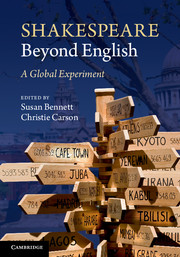Foreword
Published online by Cambridge University Press: 05 June 2014
Summary
It was only four days in to the Globe to Globe Festival. We had already seen the sublime Isango come and go with their sung and danced Venus and Adonis, that afternoon we had premièred the Vahktangov's cerebral and monochromatic Measure for Measure, and tonight was the second and last performance of the Māori Troilus and Cressida. They had erupted onto the stage the day before with their visceral tribal version, their bodies almost naked, their buttocks painted with swirling green Pacific patterning, eyes popping and feet stamping, as if they were trying to pound their way through the earth back to New Zealand. The acting was exhilarating and supple, turbo-charged and witty. The show finished, and the curtain call exploded into a haka, that articulate yell which thrills the blood. No sooner had they finished than the audience erupted in turn. But not with conventional applause. About sixty Māori, who had discreetly placed themselves around the back of the yard, shrieked back at the stage, doffed their coats onto the floor and hunkered down, pounding out a combative rhythm straight at the stage. The audience was thrilled and terrified, caught in the no man's land between two groups of mammoth Māori rehearsing an old tribal war rite. When it finished there was more mad applause. I was up in the Upper Gallery in one corner, and watched the thrilled and babbling audience filter out of the vomitoria. They left one group in the middle. It was the Deafinitely Theatre troupe, later in the Festival to play Love's Labour's Lost, all of them hearing-impaired, vigorously signing their responses and ideas to each other. ‘Hello,’ I thought, ‘we may be on to something here.’
- Type
- Chapter
- Information
- Shakespeare beyond EnglishA Global Experiment, pp. xxiii - xxivPublisher: Cambridge University PressPrint publication year: 2013

